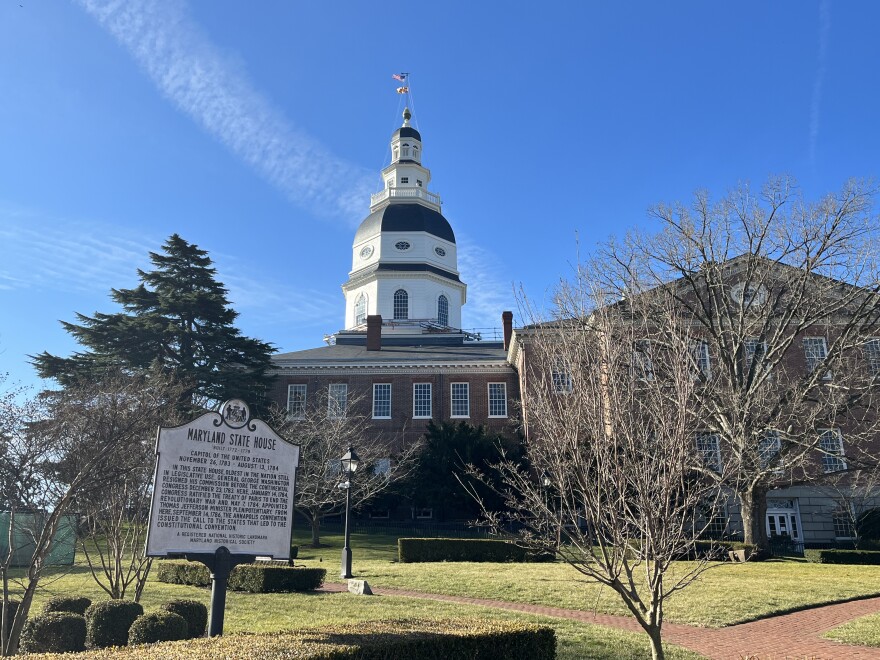Bush:
I’m Matt Bush with WYPR news. Joining me now is WYPR senior reporter Rachel Baye, who joins us from the Maryland Association of Counties conference, which is being held in Cambridge. State leaders there offered a preview of the General Assembly session that will begin in a few weeks in Annapolis.
Rachel, thank you for joining us.
Baye:
My pleasure.
Bush:
Rachel, what is one topic likely to dominate the coming session in Annapolis?
Baye:
The big topic this year will be the budget. Eric Luedtke, senior policy adviser to the governor, laid it out pretty clearly:
Luedtke:
We are facing … the single-most challenging budget environment for the state in at least 20 years — a $2.7 billion one-year deficit, plus a structural deficit in the out years. Added to that is the uncertainty of what's going to happen at the federal level.
Baye:
The issue isn’t that state revenues aren’t growing. Rather, revenues are growing slowly, while spending is projected to grow much faster.
Bush:
Now have lawmakers revealed any plans for tackling the deficit?
Baye:
We will get more details as the session gets closer and after the governor introduces his proposed budget in about a month.
At this point, state lawmakers and the governor are raising ideas for how to expand the tax base, attracting both businesses and residents.
House Majority Leader David Moon noted that the state’s population has been either stagnant or on the decline in the last several years.
And he hopes to address this in part by reversing shortages in housing and childcare.
On the other hand, Republican leaders are renewing calls to cut back on state spending, especially on education, and to repeal what they say are unfriendly business policies.
Senate Minority Leader Steve Hershey said there’s one thing lawmakers need to avoid.
Hershey:
As you talk to the people, you talk to, you know, your constituents and those in the community, the last thing they want to see is increased taxes. Maryland is already overburdened with the amount of taxes that they pay. So we've got to be able to fix this problem without raising taxes.
Baye:
Gov. Wes Moore, in remarks he made Thursday night, also said more taxes are not the answer to the state’s budget problems.
Bush:
Speaking of the governor, he announced a few policies during that speech you just mentioned. Tell us what he had to say.
Baye:
He announced an executive order focused on economic development. He hasn’t released the text yet — he said he will sign it in a few days — but he said it will streamline development by cutting red tape, and provide a targeted boost to technology, defense and life sciences sectors.
He also plans to introduce legislation to boost teacher recruitment and retention and to address housing shortages.
Bush:
Aside from the budget and the policies the governor mentioned, what other other major issues are likely to be prominent in Annapolis starting in January?
Baye:
Luedtke, the governor’s senior policy adviser, predicted that energy policy will be the second-most discussed topic after the budget. And the lawmakers who spoke today seemed to agree with that.
This is House Minority Whip Jesse Pippy.
Pippy:
We are closing down power generating sources in our state, which is forcing us to import more energy at higher costs. We have a cliff of energy costs coming this year, meaning that for the everyday, hard-working tax-paying Marylander, their energy costs are going to rise up to 30, 40%.
Baye:
He said wind and solar energy won’t fix the problem.
On the other hand, Moon, the House majority leader, also highlighted the likelihood that energy prices are going to rise. However, he said part of the reason Maryland lags other states in energy production is that local communities have pushed back on allowing energy generation projects to be built there.
So that’s a little preview of the kind of debate we could see when lawmakers return to Annapolis on Jan. 8.
Bush:
That’s Rachel Baye, WYPR’s senior reporter, coming to us from Cambridge, Maryland, where she’s attending the Maryland Association of Counties conference.
Rachel, thanks for joining us.
Baye:
My pleasure.
Bush:
I’m Matt Bush, and you’re listening to WYPR News.






